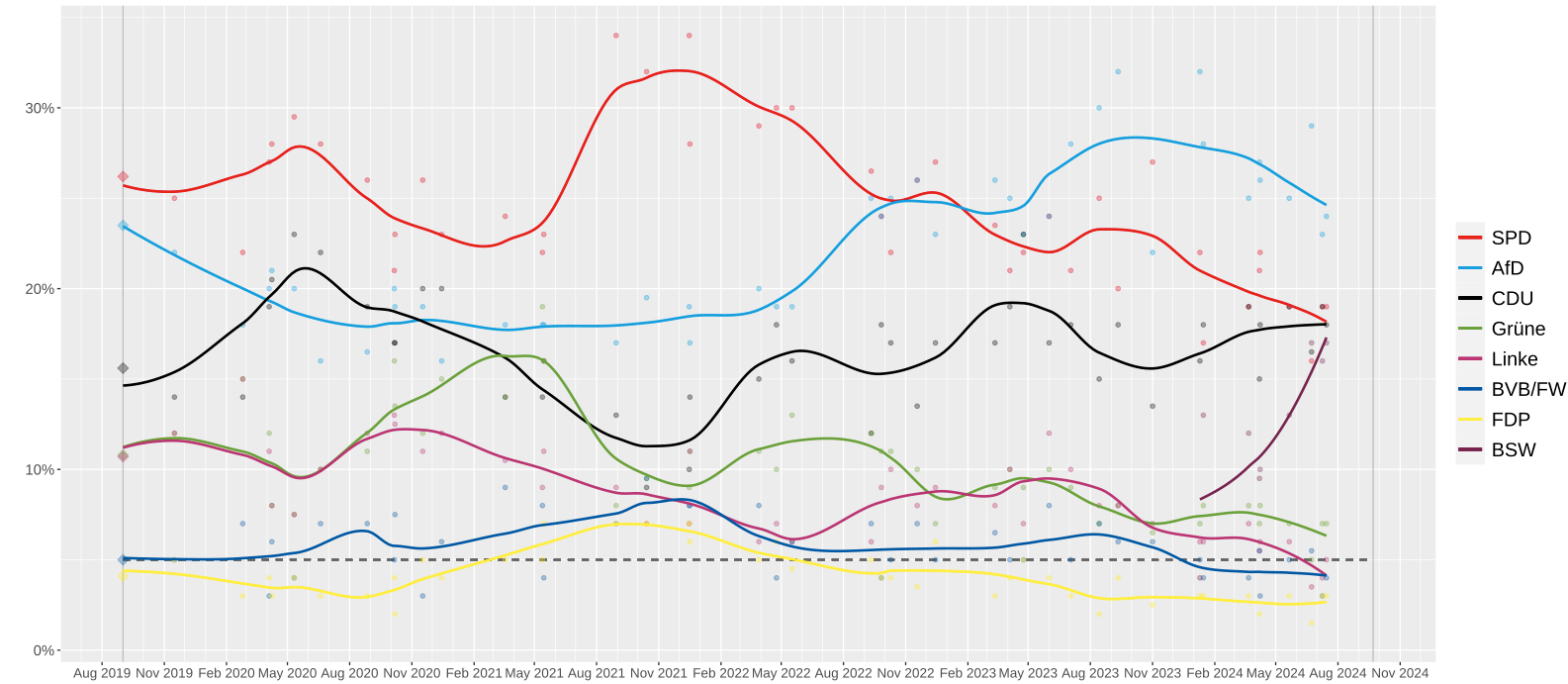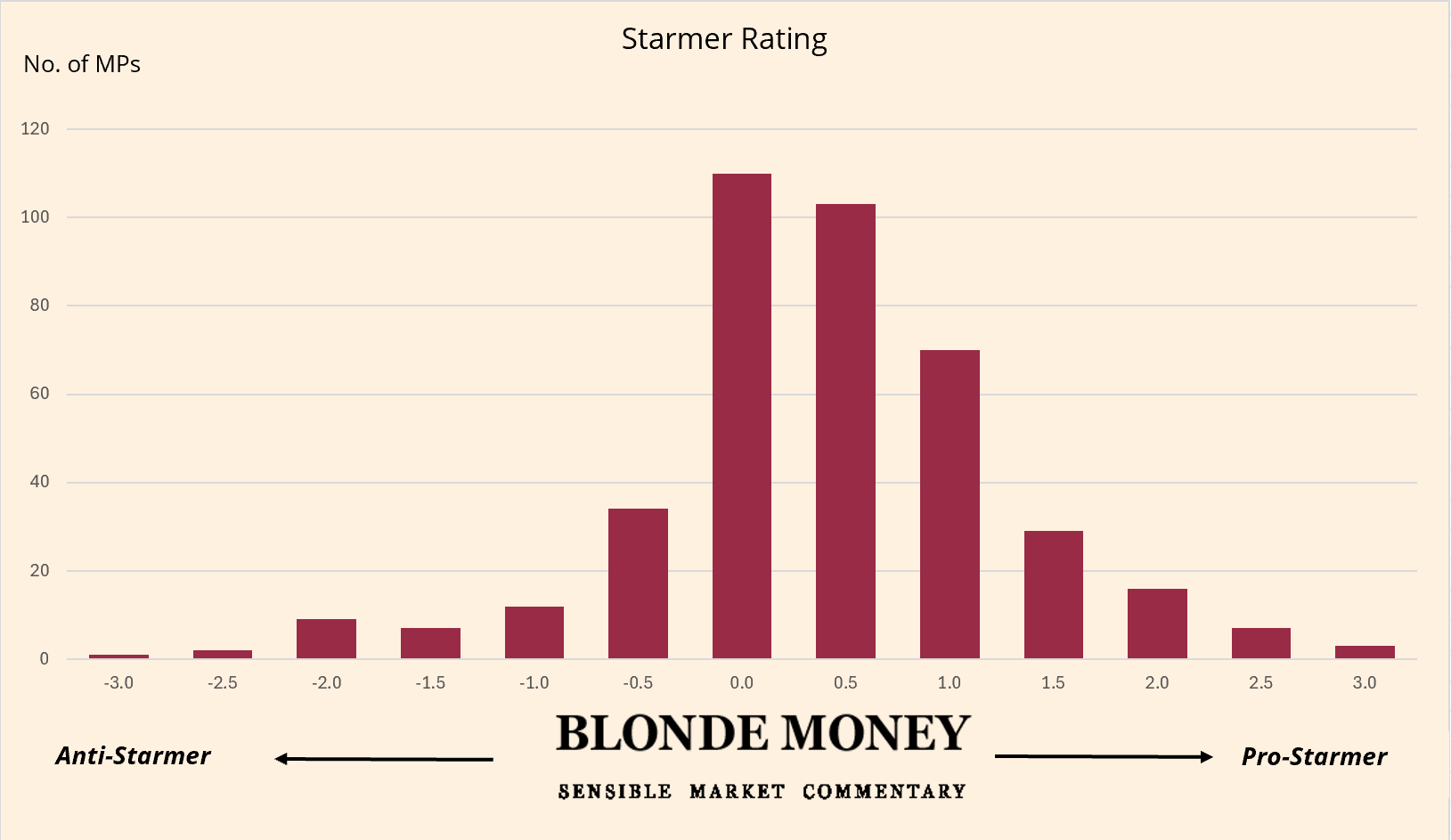
2nd September 2024
German State Elections
- Between them, the two parties of the far left and the far right took almost half of the votes in the latest German State Elections:
- 48.6% in Thuringia and 42.4% in Saxony
- The scale of their success nullifies a number of misconceptions about each
- That the rise of the new party on the far left, the BSW, would eat into the AfD vote and render them less of a threat to the centrist parties;
- That the BSW, having only been officially created in January of this year, was merely a personality cult around its founder, the former leader of The Left, Sahra Wagenknecht;
- That neither party would get close to power given traditional parties cordon sanitaire around working with any extremists.
- It also reinforces how hard it is to govern when newer parties reach such a threshold of support.
- In neither state is a majority of seats for the ‘traditional’ parties possible.


- This is due to a collapse in support for the three parties in coalition at the national level.
- The FDP didn’t even make it past the electoral threshold for representation, registering barely 1% of the vote in either state.
- In our analysis of the 2021 German federal election we noted that if Christian Lindner took the FDP into an unpopular and unsteady coalition that it would either be the end of him or the end of his party.
- The way it’s going, it will be both.
- We warned in our “The Year That Will Be” that Germany could face an unexpected early election.
- These results make that outcome more likely.
- Although it appears to be electoral suicide for the coalition to collapse, it is starting to become more toxic for it to persist. There is only one year left before the federal election. With persistently poor polling for the three coalition parties they don’t have much time left to establish themselves as independent entities and salvage the support from their core voters, let alone anyone else. While they compromise with one another, the parties on the extremes are eating their lunch.
- These results make that outcome more likely.

- The next electoral test will be Brandenburg’s state election on 22nd September.
- Current opinion polls demonstrate a similar pattern of collapsing support for the three parties who govern at a federal level with momentum growing for BSW but not enough to prevent the AfD being in top position:
(By Gbuvn – Own work, CC BY-SA 4.0, https://commons.wikimedia.org/w/index.php?curid=124056966):
- Current opinion polls demonstrate a similar pattern of collapsing support for the three parties who govern at a federal level with momentum growing for BSW but not enough to prevent the AfD being in top position:

- It is no longer enough for the mainstream parties to ignore the “extremes”. Not least because it has become almost impossible to govern without them.
- From the Sweden Democrats to the Brothers of Italy, apparent “extremist” parties, who were inconceivable coalition partners to traditional parties, have taken roles in government.
- Do not rule out a role in some regard for Le Pen’s National Rally in France given the inability of Macron to find a majority for any prime ministerial candidate.
- Governing everywhere is becoming difficult. Electorates are fractured. Immigration is just one issue but it is the common thread across all the large western countries.
- When the pie doesn’t seem to be growing, whether as a result of inflation or lack of productivity, everyone has to argue over their slice of the pie.
- Traditional parties don’t have the answers. So far, neither do newer parties other than by defining themselves against the traditional parties.
- Wagenknecht considers her party to be an alternative to the Greens, the SPD and her old party, The Left. She has said there has been too much focus on the “left lifestyle” who are focused on pronouns rather than “reaching the people who are dissatisfied”.
- But she specifically did not incorporate “left” into the name of her party as she is trying to create something new.
- Her social conservatism and anti-NATO, pro-Russia stance are shared by the AfD.
- The AfD’s leader in Thuringia, Bjorn Hocke, once invited Wagenknecht to defect to his party.
- Wagenknecht considers her party to be an alternative to the Greens, the SPD and her old party, The Left. She has said there has been too much focus on the “left lifestyle” who are focused on pronouns rather than “reaching the people who are dissatisfied”.
- The split between authoritarian and libertarian approaches is hardening.
- The authoritarian clarion call is loudest in East Germany but not absent elsewhere.
- As DW put it, quoting East German historian Kowalczuk, ‘many in eastern Germany see the “open society” as fueling insecurity rather than giving them new opportunities‘.
- The authoritarian clarion call is loudest in East Germany but not absent elsewhere.
- The fracturing of parties will persist until a new settlement is found.
- The US presidential election is a battle between a wannabe repeat insurgent and a last minute young pretender. Both are defining themselves as against the other when voters want something new to pro-actively vote for.
- The UK stands out as stable with a huge victory for an old party.
- But how united will Labour remain once the Conservatives head the polls by Christmas? At some stage the deliberate bid for unpopular measures now by PM Starmer to deliver sunlit uplands later will test the stomachs of embryonic MPs.
- He will argue that he is executing The Right (Left) Way but the public want a whole new way forward.



